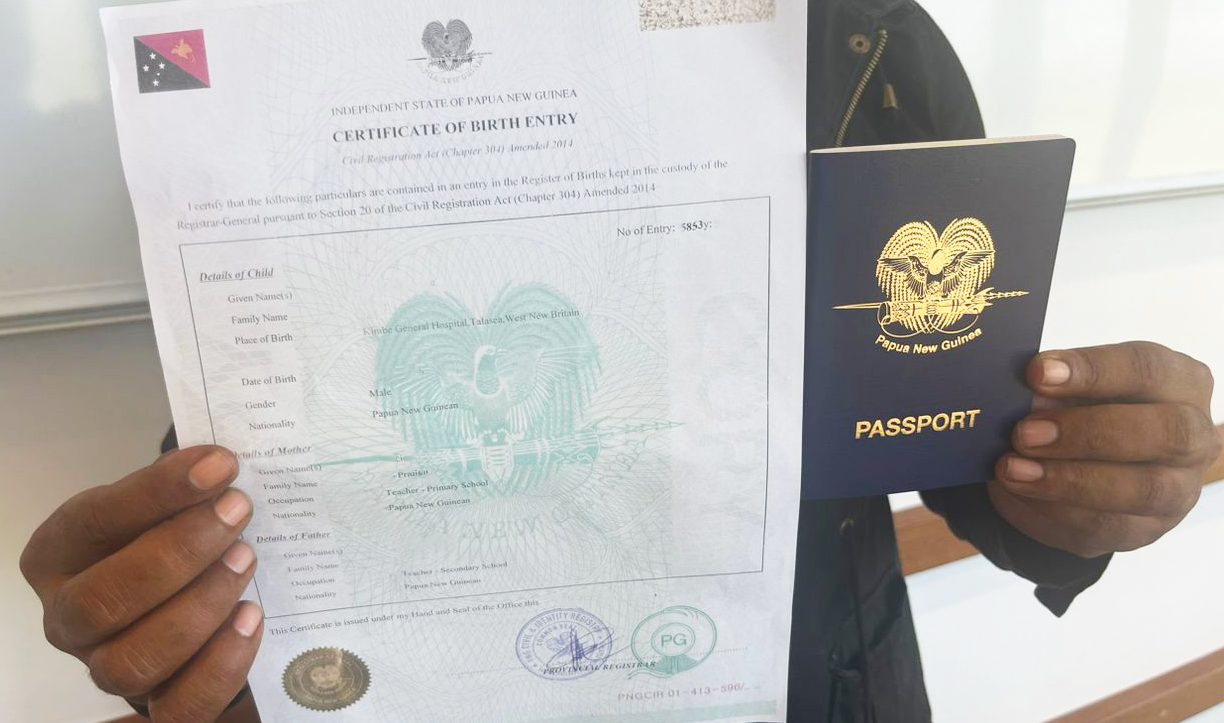In Papua New Guinea, birth certificates are issued by the PNG Civil and Identity Registry (PNGCIR). They are important identity documents, not least because they are required by the PNG Immigration and Citizenship Services Authority (PNGICSA) as prerequisites for the issuance of passports.
However, the processing and issuance of birth certificates is frustratingly slow.
The inception of the PNG National Identity (NID) card project in 2019 has compounded the problem. The same agency, PNGCIR, is also tasked with registering, processing and issuing NID cards. And a single form has been introduced to register for both birth certificates and NID cards. The amalgamation of the application processes has increased rather than reduced the delays. There is a huge backlog of NID applications — for example, in 2022 the registry admitted the backlog numbered 350,000 — and presumably the same is true of birth certificate applications.
Many ordinary Papua New Guineans have expressed their discontentment about the current situation on the PNGCIR Facebook page.
One example of the impact of processing times is given by the ANU-UPNG Partnership, which requires birth certificates for students from the University of Papua New Guinea (UPNG) to attend a summer-school program. This is a month-long intensive academic program at the Australian National University (ANU) for ten high-achieving third-year economics and public policy students funded by the PNG-Australia Partnership. Most summer school students have never left the country and so don’t have a passport.
Delays in getting NID and birth certificates almost derailed our 2019 summer school. Since then, we have started applications much earlier. We pay a priority servicing fee of K40 per applicant which is meant to ensure that birth certificates are issued within a month. In fact, it takes much longer than that.
This year, nine of our students needed birth certificates. They had applied for them earlier, and with the support of the ANU-UPNG Partnership were issued the certificates, but only after waiting for more than six months.
Constant follow-up is key, both in person and via email. Advice from recent UPNG graduates who now work in the PNGCIR office is of enormous help. The two universities also provide joint support letters to the students to add urgency to birth certificate applications.
There is some good news, at least. Once the birth certificates are issued, passports follow fairly quickly. The first four passports were issued in the first six weeks, and at the time of writing, PICSA had just issued the rest of the passports within a second six-week period. Compare this to the two years it took for my passport to be issued in 2006, and you can appreciate the extent of the improvement.
If we face long delays getting birth certificates for our students, despite having good advice and being able to pay a priority processing fee, imagine what it is like for the rural population and people in towns other than the capital, as birth certificates are processed and issued mostly in Port Moresby.
People in PNG are very patient despite the long delays and cumbersome administrative processes they face in obtaining important documents such as birth certificates, NID cards, police clearances and land titles — in addition to the delays they face in opening bank accounts and accessing superannuation funds.
But, as the passport example shows, improvements are possible. Underlining this is the fact that the Internal Revenue Commission and the Investment Promotion Authority of PNG have been able to make significant strides in recent years in simplifying the registration of companies, including by moving the process online.
Progress to improve access to basic government services by ordinary Papua New Guineans is both possible and essential. The PNGCIR and many other government agencies really need to lift their game.
This issue and other issues related to migration in Papua New Guinea will be discussed at the PNG Update to be held on 21-22 August at the University of Papua New Guinea’s Waigani campus. Organised by the UPNG’s School of Business and Public Policy and the ANU’s Development Policy Centre, the annual event is free to attend. No registration is required. View the full event details including the livestream link.





I am trying my very best to get a NID and birth certificate done in order to process passport to obtain passport, is there an online application that I can fill in? If so, can I have the link please?
I am trying my best to get a birth certificate done in order to process passport to obtain a student passport. Is there an online application that I can fill in? If so, can I have the link please?
I am a student who was excepted to study in Okmin University in Indonesia. However I couldn’t manage to process my passport ,because I only received the NID Card. And my birth certificate is said to be in Port Moresby While I’m in my home town (Vanimo).
Could you please help me to send me my birth certificate to Vanimo immediately?
I have a passport but need my BC re-issued and have been trying for months, from Australia, to get it happening via email (nobody ever answers phone lines) and I get a reply maybe once or twice a month. It is infuriating.
Hi Elaine. I am happy to help out. Devpolicy Blog staff will send you my contact details.
Did you end up getting a birth certificate? I have applied and still waiting for my partner’s certificate.
I have applied for a scholarship,but have been denied due to have not having a birth certificate,I have enquire twice at pngcir to collect but fail , further more I have a issue nid card without a birth certificate